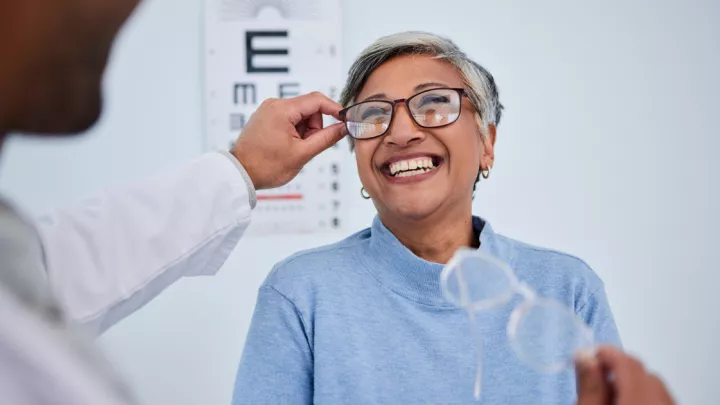How to choose contact lenses that fit your needs

For many, contact lenses can be very convenient and provide multiple benefits. Today’s contact lenses offer a variety of options to fit people’s needs and lifestyles. They can also be worn to help with various eye impairments, including nearsightedness, farsightedness, age-related farsightedness and astigmatism.
Some of these benefits include:
- Better peripheral vision.
- Cosmetic appeal.
- More options for sunglasses.
- Better suited for those who play sports.
- Help with some medical conditions.
But not everyone is a candidate for contact lenses. To determine if contacts are right for you and to ensure you choose the type that best fits your needs, Delray Gust, ABOC, Nebraska Medicine optician, recommends the following advice and considerations.
Who shouldn’t wear contact lenses
There are a few groups of people who shouldn’t wear contact lenses. These people include those with:
- Dry eye disease
- Recurrent eye infections
- Severe allergies
Avoid using online prescription websites for glasses or contact renewal. “With these sites, you are basically self-prescribing your contact lenses as online tests are just not very accurate,” says Gust. “Nothing is better than an in-person exam. Not only that, you really don’t know what you’re getting in terms of the actual contact lenses. The packaging on the contacts can vary making it hard to verify that the prescription is correct.”
Schedule an appointment with an eye specialist. This should be your first step in deciding whether contact lenses are right for you. The eye specialist will evaluate your eyes to determine if any issues would prevent you from being a candidate for contacts. “Everyone has different needs depending on their eye health, medical history and lifestyle,” says Gust.
The eye specialist will also perform a refraction test to determine your prescription. This test will diagnose vision problems such as astigmatism, farsightedness, nearsightedness, and presbyopia.
If your eye specialist determines you are a good candidate, there are several options to consider before choosing your contacts. These include:
Wear schedule
Daily disposable contacts. With this type of contact, a new pair is worn each day and disposed of before bed. Never reuse daily disposable contacts. Daily disposable contacts are especially beneficial for people who have allergies, are at risk for dry eye disease or have issues with contact lens solutions.
There is also an option for disposable contacts that can be cleaned and stored overnight and used again the following day. These lenses can typically be used for up to 30 days.
Daily-use contact lenses are soft lenses made of flexible plastic that can easily form to the shape of your eyes. “Most people find these to be the most comfortable,” says Gust. “Big improvements have been made in these lenses in the past 20 years. They have a thinner profile that allows them to better form to a variety of eye shapes. They are also made of a newer material that allows them to breathe better and lets water pass through, which helps prevent dry eyes.”
Also, keep in mind that soft lenses are fragile, and care must be taken to prevent tearing or ripping them.
Extended wear lenses. These contacts can be worn for an extended amount of time, usually up to 30 days. “They are promoted as being able to be worn during the day and while you sleep, but we never recommend leaving your contact lenses in while you sleep,” says Gust. “Your eyes need time to breathe, and overwear can lead to dryness and/or sensitivity and raise the risk of infection.”
Extended-wear lenses are also made of a soft plastic but are a bit more rigid than the daily disposable contacts.
Eye prescription
Today’s contacts can be fitted in a number of ways to account for nearsightedness, farsightedness, age-related farsightedness, astigmatism or a combination of these impairments. For instance, one contact can be designed for up-close vision and the other for distance vision. This is called mono-vision.
Multifocal lenses are also available. Sometimes, multifocal contact lenses may improve your vision for one impairment but deter your vision for another. “There is a balance to this process, and it is essential to work with your provider to find the lenses that work best for you,” Gust says. “Sometimes you may be able to try the power before you purchase contacts. Discuss your options with your provider.”
Your age
Age and maturity should also be considered when deciding if contact lenses are right for you or a family member. If you are considering contact lenses for your child, they should be old and mature enough to properly care for their contact lenses to avoid the development of eye infections or other issues.
An older adult may be too forgetful or may not have the dexterity to put in contacts or take them out of their eyes.
In general, wearing contacts is a great convenience for many people and is reasonably safe as long as you practice good hygiene when caring for your contacts and follow the care and replacement schedule recommended provided by our provider, says Gust.
Call 800.922.0000 to schedule an appointment with one of our eye specialists.







